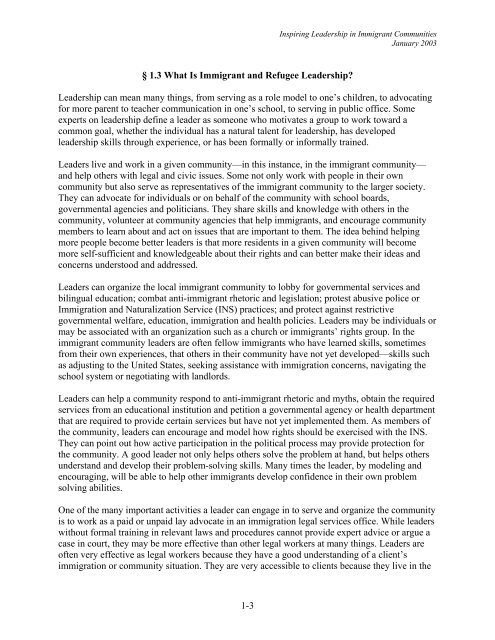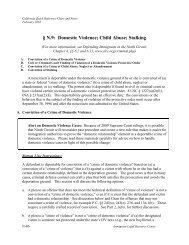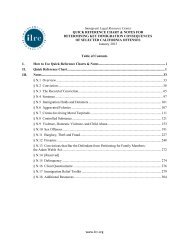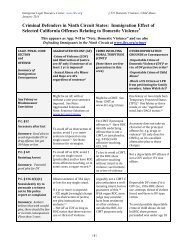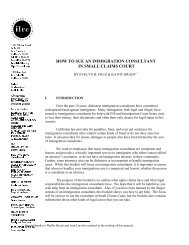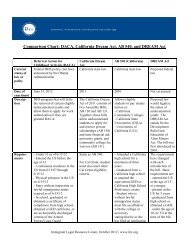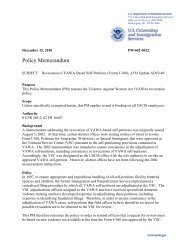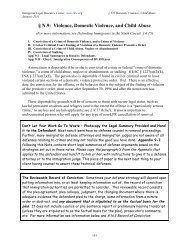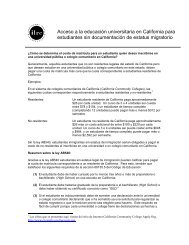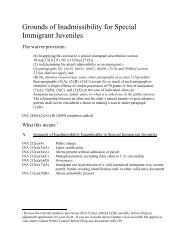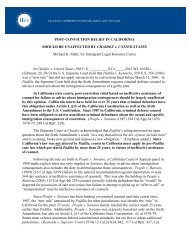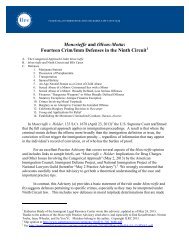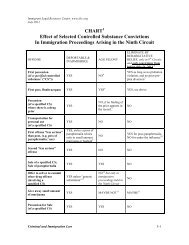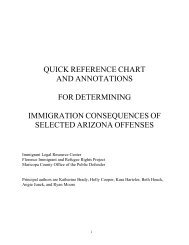Inspiring Leadership in Immigrant Communities - ILRC
Inspiring Leadership in Immigrant Communities - ILRC
Inspiring Leadership in Immigrant Communities - ILRC
- No tags were found...
You also want an ePaper? Increase the reach of your titles
YUMPU automatically turns print PDFs into web optimized ePapers that Google loves.
<strong>Inspir<strong>in</strong>g</strong> <strong>Leadership</strong> <strong>in</strong> <strong>Immigrant</strong> <strong>Communities</strong>January 2003§ 1.3 What Is <strong>Immigrant</strong> and Refugee <strong>Leadership</strong>?<strong>Leadership</strong> can mean many th<strong>in</strong>gs, from serv<strong>in</strong>g as a role model to one’s children, to advocat<strong>in</strong>gfor more parent to teacher communication <strong>in</strong> one’s school, to serv<strong>in</strong>g <strong>in</strong> public office. Someexperts on leadership def<strong>in</strong>e a leader as someone who motivates a group to work toward acommon goal, whether the <strong>in</strong>dividual has a natural talent for leadership, has developedleadership skills through experience, or has been formally or <strong>in</strong>formally tra<strong>in</strong>ed.Leaders live and work <strong>in</strong> a given community—<strong>in</strong> this <strong>in</strong>stance, <strong>in</strong> the immigrant community—and help others with legal and civic issues. Some not only work with people <strong>in</strong> their owncommunity but also serve as representatives of the immigrant community to the larger society.They can advocate for <strong>in</strong>dividuals or on behalf of the community with school boards,governmental agencies and politicians. They share skills and knowledge with others <strong>in</strong> thecommunity, volunteer at community agencies that help immigrants, and encourage communitymembers to learn about and act on issues that are important to them. The idea beh<strong>in</strong>d help<strong>in</strong>gmore people become better leaders is that more residents <strong>in</strong> a given community will becomemore self-sufficient and knowledgeable about their rights and can better make their ideas andconcerns understood and addressed.Leaders can organize the local immigrant community to lobby for governmental services andbil<strong>in</strong>gual education; combat anti-immigrant rhetoric and legislation; protest abusive police orImmigration and Naturalization Service (INS) practices; and protect aga<strong>in</strong>st restrictivegovernmental welfare, education, immigration and health policies. Leaders may be <strong>in</strong>dividuals ormay be associated with an organization such as a church or immigrants’ rights group. In theimmigrant community leaders are often fellow immigrants who have learned skills, sometimesfrom their own experiences, that others <strong>in</strong> their community have not yet developed—skills suchas adjust<strong>in</strong>g to the United States, seek<strong>in</strong>g assistance with immigration concerns, navigat<strong>in</strong>g theschool system or negotiat<strong>in</strong>g with landlords.Leaders can help a community respond to anti-immigrant rhetoric and myths, obta<strong>in</strong> the requiredservices from an educational <strong>in</strong>stitution and petition a governmental agency or health departmentthat are required to provide certa<strong>in</strong> services but have not yet implemented them. As members ofthe community, leaders can encourage and model how rights should be exercised with the INS.They can po<strong>in</strong>t out how active participation <strong>in</strong> the political process may provide protection forthe community. A good leader not only helps others solve the problem at hand, but helps othersunderstand and develop their problem-solv<strong>in</strong>g skills. Many times the leader, by model<strong>in</strong>g andencourag<strong>in</strong>g, will be able to help other immigrants develop confidence <strong>in</strong> their own problemsolv<strong>in</strong>g abilities.One of the many important activities a leader can engage <strong>in</strong> to serve and organize the communityis to work as a paid or unpaid lay advocate <strong>in</strong> an immigration legal services office. While leaderswithout formal tra<strong>in</strong><strong>in</strong>g <strong>in</strong> relevant laws and procedures cannot provide expert advice or argue acase <strong>in</strong> court, they may be more effective than other legal workers at many th<strong>in</strong>gs. Leaders areoften very effective as legal workers because they have a good understand<strong>in</strong>g of a client’simmigration or community situation. They are very accessible to clients because they live <strong>in</strong> the1-3


